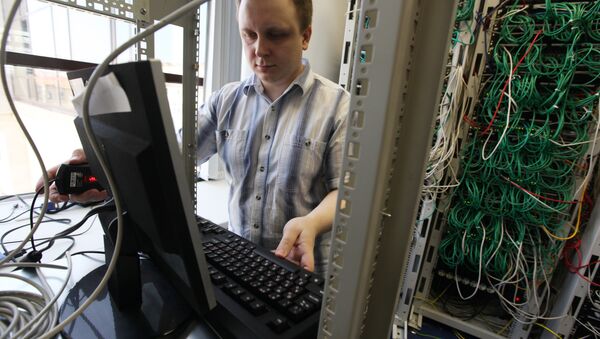Sputnik: What is your assessment of the current digital situation in Russia?
Alexander Borodich: I would say that Russia is taking the path of digital transformation and both entirely as a country, they’re switching all the processes from the old-school way of doing things to the digitalization and “blockchainization” if I can put the words like this. And both in Moscow and here in St. Petersburg there’re a lot of discussions on how these digital transformations should look like? What kinds of processes we should transform at first and to what extent? Because it goes without saying that the 4th technological revolution would be in digital or would be in blockchain. So not to miss this revolution we have to somehow lead this process.
Sputnik: I spoke to a person who’s working in the energy field and he was talking about the application of blockchain and energy distribution and power grids. And one of the things that he mentioned is technology right now is way ahead of legislation. Is it so? Do we see legislative problems in the way of this digital revolution?
Alexander Borodich: I wouldn’t say so. The blockchain itself is just the technology. It’s nothing more than an additional technological layer, which is connecting the previously not yet connected IT systems. So from this perspective we don’t need any additional legislation to keep it working. The only one part of application on top of the blockchain, which is related to cryptocurrencies, they need to be somehow regulated. But as for digitalization and tokenization processes in energy, in retail, we shouldn’t have any kind of additional legislation.
Sputnik: Your company, Universa, what place do you see? What kind of position is it hoping to achieve in this world and what kinds of projects are you working on right now?
Alexander Borodich: We at Universa currently would see one of the fastest and cheapest blockchains on the market so our ultimate goal is to create the application layer for digital currencies, not cryptocurrencies, but digital currencies, smart money.
For example, at Universa we’ve created halal money, that’s smart cash, which you simply can’t spend on alcohol and tobacco in the Islamic world. So also there’re ideas to work with governments, with central banks, to allow them to issue digital cash in their currency, not a cryptocurrency but centrally issued 100 percent controlled new digital cash, which is way cheaper than the paper money, which you can control from A to Z and it’s a more efficient way of doing things and our wallets would be our mobile wallets. All of us have smartphones currently.
Sputnik: Speaking of your projects abroad, the Russian media recently reported that you’re planning to start projects with your colleagues in China. How’s it going? Are there any new developments there?
Alexander Borodich: We have signed an agreement with 50 universities in China. Because China would like to lead the educational process in the blockchain world, to deliver as many engineers and blockchain developers as possible. And here I see the lack of energy and enthusiasm from the Russian side because if China can produce thousands of developers per year from such initiatives, thanks to us they would know how to use Universa blockchain as a blockchain platform, but here in Russia we see way less energy.
And we’re trying to push forward with several Russian universities, but it’s more than difficult to move it forward unfortunately for us. But we do whatever we can do to push the educational initiatives also here in Russia because we know for sure that there’re Russian developers, Russian blockchain engineers, they’re the best of the best in the world. I would say that 70 percent of blockchain developers are Russian-speaking developers from the Eastern world.
Sputnik: Does it mean that right now we would have to rely and in the future we’d have to rely on those who’ll be graduating in a few years from now, but not on attracting those who already immigrated to Silicon Valley, for example? Do we have hope of attracting them in our blockchain industry?
Alexander Borodich: I wouldn’t say so. I would think that Silicon Valley was created and was so famous due to the internet wave, the third wave of the technological revolution.
At this 4th digital wave of technology would lace upon the new way of “blockchainization” and we still don’t have courses, any educational programs. There’s no master course in blockchain yet. Those initiatives have just yet started. So those who will lead this revolution they have just started to learn stuff both in Russia and China and our goal is to help them to get to know things as soon as possible because the world will need thousands of blockchain developers pretty soon.
Sputnik: You mentioned that China has a little bit more interest in such projects than perhaps Russia at the moment. But here at the St. Petersburg forum you can get in touch with literally anyone from the minister of education to Skolkovo guys. And do you feel that they’re supporting your ideas?
Alexander Borodich: At least for me here at this forum we have a pretty tight schedule. Every single hour we have a new round of negotiations with the government, with the leaders of the largest Russian banks, logistic companies, energy companies. So the idea is to use the forum as a key driver to push our negotiations with all those companies forward and we’re hoping to have several contracts signed even here during those three days.
Views and opinions expressed in this article are those of Alexander Borodich and do not necessarily reflect those of Sputnik.



